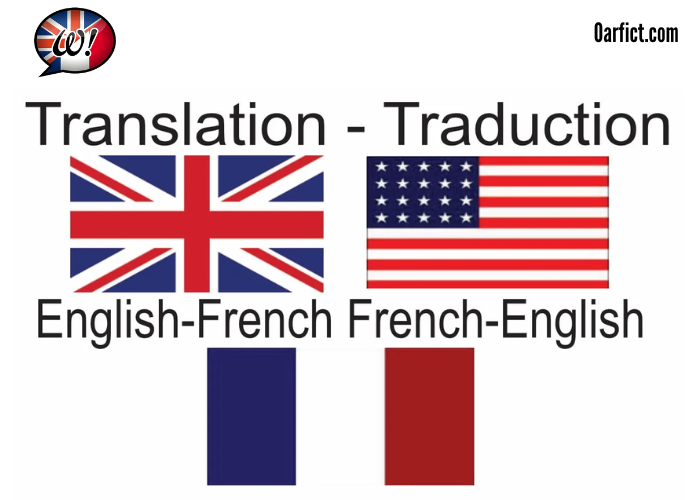In today’s globalized world, the ability to communicate in multiple languages is invaluable. One of the most sought-after language pairs for translation is English to French. Whether for business, travel, or personal enrichment, mastering this skill opens doors to new opportunities and cultural understanding.
In this comprehensive guide, we’ll explore the intricacies of translating English to French, from essential tips to advanced techniques, to help you become a proficient translator.
Understanding the English to French Translation Process
Before diving into the translation process, it’s crucial to understand the unique characteristics of both languages. English and French differ significantly in terms of grammar, syntax, vocabulary, and cultural nuances. Here’s a brief overview:
Grammar and Syntax: French has a more complex grammatical structure than English. It uses gendered nouns and has verb conjugations that change based on tense, mood, and subject.
Vocabulary: While English and French share some cognates (words with similar meanings and spellings), false friends (words that look similar but have different meanings) abound.
Idiomatic Expressions: Both languages have idiomatic expressions that don’t translate directly. Understanding these nuances is essential for accurate translations.
Tips for Effective English to French Translation
Master the Basics: Strengthen your foundation in both languages, including grammar, vocabulary, and syntax. This will make the translation process smoother.
Context is Key: Consider the context of the text you’re translating. Context often determines the most appropriate translation for a word or phrase.
Use Quality Tools: Leverage online translation tools and dictionaries but always double-check the results for accuracy. No tool is infallible, and they may miss contextual nuances.
Cultural Sensitivity: Be aware of cultural differences between English-speaking and French-speaking regions. What works in one context might not in another.
Read Widely: Read extensively in both languages to familiarize yourself with various styles, tones, and registers.
Challenges in English to French Translation
Verb Conjugation: French verbs are notorious for their complex conjugations. Mistranslating verb tenses can change the entire meaning of a sentence.
Pronoun Usage: French often omits subject pronouns that are necessary in English. Choosing the correct pronoun is crucial.
Gendered Nouns: French nouns are gendered (masculine or feminine), and adjectives must agree with the gender of the noun they modify.
Cultural Nuances: French culture and etiquette differ from English-speaking cultures. Understanding these nuances is vital for translating accurately.
Advanced Techniques for English to French Translation
Transcreation: Sometimes, a direct translation doesn’t capture the intended message. Transcreation involves adapting the content to evoke the same emotions and impact as the source text.
Localization: Tailor your translations for specific French-speaking regions, like France, Canada, or Belgium, as they may have distinct vocabulary and expressions.
Proofreading and Editing: Always review and revise your translations. Consider seeking feedback from native speakers or professional editors.
Stay Current: Language evolves over time. Stay up-to-date with the latest language trends, idioms, and vocabulary.
Exploring Translation Tools and Resources
In your quest to master the art of translating English to French, it’s essential to utilize various tools and resources at your disposal. Here are some valuable assets to aid your translation journey:
Online Translation Platforms: There are numerous online translation platforms like Google Translate, DeepL, and Microsoft Translator. While these can be helpful for quick reference, they should not be relied upon exclusively, as they may not always provide contextually accurate translations.
Bilingual Dictionaries: Invest in quality bilingual dictionaries that provide detailed explanations and examples of word usage. Some reputable options include Larousse, Collins, and Oxford.
Translation Memory Tools: For those involved in professional translation, Translation Memory (TM) tools such as SDL Trados and MemoQ can be indispensable. They store and reuse translations, ensuring consistency across projects.
Style Guides: Familiarize yourself with style guides such as the Chicago Manual of Style and the Associated Press (AP) Stylebook. These guides can help you maintain consistency in your translations, especially in areas like punctuation and formatting.
Literary Works: Reading books, magazines, and newspapers in both languages can enhance your vocabulary and understanding of cultural nuances. Explore works of literature, including classics and contemporary literature, to gain insight into diverse writing styles.
Language Courses and Tutors: Enroll in language courses or seek the guidance of a qualified tutor. Language courses can provide structured learning, while a tutor can offer personalized instruction and feedback.
Translation Associations and Communities: Join translation associations like the American Translators Association (ATA) or the Chartered Institute of Linguists (CIOL). Participate in online forums and communities where translators exchange knowledge and experiences.
CAT (Computer-Assisted Translation) Tools: CAT tools like SDL Trados and OmegaT can help manage translation projects efficiently. They offer features like translation memory, terminology management, and quality assurance checks.
Terminology Databases: Use terminology databases like Termium Plus (for Canadian French) and Grand dictionnaire terminologique (for European French) to ensure accuracy in specialized fields.
Translation Challenges: Participate in translation challenges and contests to hone your skills and receive constructive feedback from experienced translators.
Conclusion
Becoming a proficient English to French translator is a rewarding journey that requires dedication, practice, and ongoing learning. By understanding the intricacies of both languages, mastering essential tips, and employing advanced techniques, you can provide accurate and culturally sensitive translations that bridge linguistic and cultural divides.
Whether you’re translating for business, literature, or personal enjoyment, this skill will open doors to a world of opportunities and cross-cultural understanding. Start your journey today and unlock the power of translation from English to French.
